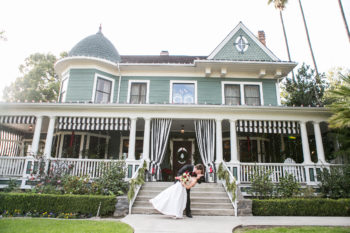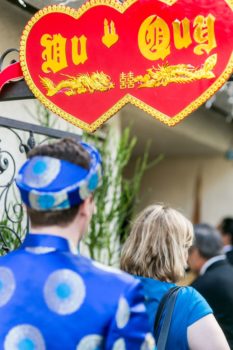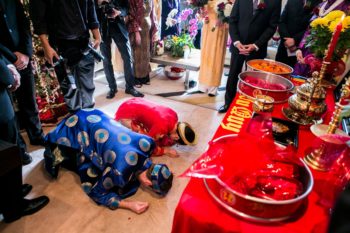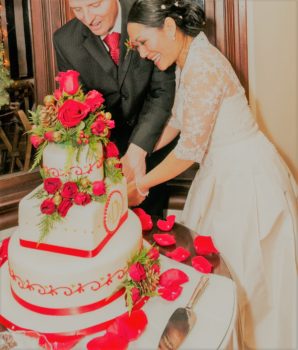Vietnamese Marriage Customs (3) – Lễ Cưới

Lễ cưới or Hôn lễ or Lễ Thành hôn is the marriage/wedding ceremony.
Ngày cưới is the wedding/marriage day.
Lễ cưới is one of the most important events in one’s life and ngày cưới is one of the most important days for any couple. Whether it was miserable due to the stress, or joyful due to the overwhelming, full range of emotions, it’s definitely memorable for everyone who is involved.
For most, if not all Vietnamese girls, ngày cưới is a very emotional and exhausting day for her. She might cry and laugh many times during the day. She had to awaken really early to get a special bridal làm tóc (hairdo) and trang điểm (make up). At the end of the day, she crashed from the fatigue. It was a full day of enduring the series of ceremonies and celebrations as described below.
LỄ XIN DÂU (asking for the bride ceremony)

Before the hour of picking up the bride, some of the groom’s family members and relatives go to the bride’s house, bringing lots of gifts wrapped in red cellophane paper. The gifts are similar to the betrothal gifts for the engagement ceremony, including betel leaves, areca nuts, wine, tea, cakes, jewelries, and more. This was the step to request consent, announce that the groom is about to come to pick up the bride, and is for the bride’s family to prepare to welcome the bridal procession. You often see the sign “Vu Quy” hanging by the bride’s house entrance.
LỄ RƯỚC DÂU (pick up the bride ceremony or bridal procession)
At the pre-arranged, auspicious time, the groom, joined by his father and other members of the family or relatives, bring the flower bouquets to the bride’s house, and pick up the girl from her home.
Both the groom and the bride will have a short ceremony, including bowing at the ancestor table. Representatives of the bride’s family introduce the bride’s family members to the groom. Gifts, especially jewelry and money from the bride’s family are given to the bride and the couple during this time.
Parents of the bride or a representative of the bride’s family deliver some words to the young couple. It is to remind the girl about her duty and responsibility to her husband and towards the in-laws, and to ask the groom to take good care of the girl. Last but not least, to accept the son-in-law and bless the couple.
Finally, the groom asks to bring the bride home. At the groom’s house, the couple will have another ceremony to welcome the bride. Similar to like what happened with the bride’s family, the couple bows at the ancestor table. The mother of the groom says some kind words to the daughter-in-law and blesses the couple.

TIỆC CƯỚI (wedding reception)
When all the ceremonies are over, then comes the wedding reception, either organized at the groom’s house or more likely, at a wedding venue.

The couple usually wears western outfits at the beginning of the reception. The bride is in a white wedding gown and the boy is in a suit. After the foods are served, the bride changes to a traditional outfit (áo dài) and approaches each guest’s table to thank them for coming. Guests typically give the couple generous gifts, most commonly cash in an envelope.
Once the couple finishes their rounds to thank guests at each table, the bride usually changes her outfit again into a glamorous western gown to get ready for cake cutting and dancing.
To some, a wedding day for the bride is like a fashion show for her. The average number of outfits she wears is three. Some even change into four or five different outfits.
LỄ LẠI MẶT (visiting family ceremony)
The day after the wedding, it’s customary for the newlywed couple to return to the girl’s house in the morning to visit her parents for a small ceremony. It’s for them to show their filial respect to the girl’s parents.
If you have read through these Vietnamese marriage custom blog posts, I believe you now understand why my dad said it was something you only want to go through once, and that it is more than enough! Besides the cost, so much work and energy are expended to rally the whole family to complete it all. Well, at the end, according to my husband, it’s still worth the hassle.






